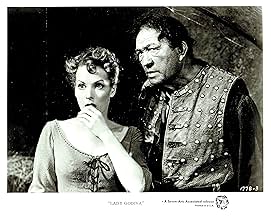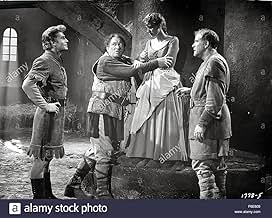NOTE IMDb
5,5/10
682
MA NOTE
Une Saxonne, Godiva, sœur du shérif de Coventry, rencontre le noble Lord Leofric, Saxon lui aussi, qui a été jeté dans un donjon pour avoir refusé d'épouser une Normande. Tous deux tombent a... Tout lireUne Saxonne, Godiva, sœur du shérif de Coventry, rencontre le noble Lord Leofric, Saxon lui aussi, qui a été jeté dans un donjon pour avoir refusé d'épouser une Normande. Tous deux tombent amoureux et se marient.Une Saxonne, Godiva, sœur du shérif de Coventry, rencontre le noble Lord Leofric, Saxon lui aussi, qui a été jeté dans un donjon pour avoir refusé d'épouser une Normande. Tous deux tombent amoureux et se marient.
Arthur Gould-Porter
- Thorold
- (as A.E. Gould-Porter)
Anthony Eustrel
- Prior
- (as Antony Eustrel)
Fred Aldrich
- Friar
- (non crédité)
Gertrude Astor
- Townswoman
- (non crédité)
Histoire
Le saviez-vous
- AnecdotesMaureen O'Hara wore a skin colored leotard when filming the famous nude riding scene.
- Crédits fousThe opening credits appear on the background of a medieval style picture of a nun leading the horse ridden by the naked Godiva, covered only by her long hair, through town.
- Versions alternativesWhen originally released theatrically in the UK, the BBFC made cuts to secure a 'U' rating. All cuts were waived in 2006 when the film was granted a 'PG' certificate for home video.
- ConnexionsReferenced in Ombres et lumières (1989)
Commentaire à la une
An 11th-century , King Edward the Confessor (Arthur Franz) wants Saxon Lord Leofric (George Nader) to marry a despised Norman woman, and has him jailed when he refuses. In prison , he meets Godiva (Maureen O'Hara) , the Sheriff's sister, and soon they fall in love and get married . The times are tumultuous and Godiva proves to be a militant wife . Unrest between the Anglo-Saxon populace and the increasingly influential Norman French lead to her famous ride.
Typical Universal adventure movie with all the usual ingredients , including glowing colour and distinctive photography in Cinemascope . Set in England , including nasty rulers , turbulent deeds , sword-play , fights , intriguing events , and many other things . Maureen O'Hara gives a passable acting as the married heroine who's soon involved in the action and plots at the royal court . O'Hara managed to spring from this ridiculous camp Oriental Adventure outing to stardom . Maureen played brave females in several Adventure/Pirate movies during the 40s and 50s in Universal Pictures , similar to Yvonne DeCarlo . In fact , the latter had recently been ill and lost a lot of weight, so much that the producers decided to replace her with Maureen O'Hara . Maureen interpreted various Muslim girls in Simbad the Sailor , Flame of Araby and Bagdad . She also performed the daughter of a powerful lord in The Black Swain , a valiant aristocrat in The Spanish Main , a feared pirate woman called Spitfire in Against All Flags and a French countess in Trípoli . Later on , in 1952 she starred At Sword point as Musketeer Athos' daughter , an untamed Australian girl in Kangaroo and finally the known Lady Godiva as the noblewoman who opens her Saxon husband's eyes by riding bareback through town. There's also the ordinary good-looking , handsome partenaire , the Californian George Nader who starred a lot of Noir , adventure , thriller and action movies , as well . Adding a good support cast , such as Victor McLaglen , Rex Reason , Torin Thatcher , Eduard Franz , Leslie Bradley , Henry Brandon , Arthur Shields , Robert Warwick , Grant Withers , among others .Colorfully produced by Robert Arthur and Universal International , being accompanied by brilliant and glimmering cinematography carried out by director of photography Carl E. Guthrie . As well as thrilling as well as moving musical score by Frank Skinner and Hans J. Salter . The motion picture was regular but professionally directed by Arthur Lubin.
If the film doesn't have too much historical perspective , however appearing some actual and important roles and essential happenings developed until the famous Hastings Battle (1066) in which William of Normandy ¨the Conqueror¨ defeated the Anglo-Saxons . As Edward the Confessor (1003 -1066) , was one of the last Anglo-Saxon kings of England. Usually considered the last king of the House of Wessex, he ruled from 1042 to 1066. Edward was the son of Canuto Hardeknut, hijo de Canuto the Great ,and Emma of Normandy. He restored the rule of the House of Wessex after the period of Danish rule since Cnut conquered England in 1016. When Edward died in 1066, he was succeeded by Harold Godwinson, who was defeated and killed in the same year by the Normans under William the Conqueror at the Battle of Hastings. Edward's young great-nephew Edgar II of the House of Wessex was proclaimed king after the Battle of Hastings in 1066 but was never crowned and was peacefully deposed after about eight weeks. Historians disagree about Edward's fairly long 24-year reign. His nickname reflects the traditional image of him as unworldly and pious. Confessor reflects his reputation as a saint who did not suffer martyrdom as opposed to his uncle, King Edward the Martyr. Some portray Edward the Confessor's reign as leading to the disintegration of royal power in England and the advance in power of the House of Godwin, because of the infighting that began after his death with no heirs to the throne. Biographers Frank Barlow and Peter Rex, on the other hand, portray Edward as a successful king, one who was energetic, resourceful and sometimes ruthless; they argue that the Norman conquest shortly after his death tarnished his image. However, Richard Mortimer argues that the return of the Godwins from exile in 1052 "meant the effective end of his exercise of power", citing Edward's reduced activity as implying "a withdrawal from affairs". About a century later, in 1161, Pope Alexander III canonised the king. Edward was one of England's national saints until King Edward III adopted George of Lydda as the national patron saint in about 1350. Saint Edward's feast day is 13 October, celebrated by both the Church of England and the Catholic Church.
Typical Universal adventure movie with all the usual ingredients , including glowing colour and distinctive photography in Cinemascope . Set in England , including nasty rulers , turbulent deeds , sword-play , fights , intriguing events , and many other things . Maureen O'Hara gives a passable acting as the married heroine who's soon involved in the action and plots at the royal court . O'Hara managed to spring from this ridiculous camp Oriental Adventure outing to stardom . Maureen played brave females in several Adventure/Pirate movies during the 40s and 50s in Universal Pictures , similar to Yvonne DeCarlo . In fact , the latter had recently been ill and lost a lot of weight, so much that the producers decided to replace her with Maureen O'Hara . Maureen interpreted various Muslim girls in Simbad the Sailor , Flame of Araby and Bagdad . She also performed the daughter of a powerful lord in The Black Swain , a valiant aristocrat in The Spanish Main , a feared pirate woman called Spitfire in Against All Flags and a French countess in Trípoli . Later on , in 1952 she starred At Sword point as Musketeer Athos' daughter , an untamed Australian girl in Kangaroo and finally the known Lady Godiva as the noblewoman who opens her Saxon husband's eyes by riding bareback through town. There's also the ordinary good-looking , handsome partenaire , the Californian George Nader who starred a lot of Noir , adventure , thriller and action movies , as well . Adding a good support cast , such as Victor McLaglen , Rex Reason , Torin Thatcher , Eduard Franz , Leslie Bradley , Henry Brandon , Arthur Shields , Robert Warwick , Grant Withers , among others .Colorfully produced by Robert Arthur and Universal International , being accompanied by brilliant and glimmering cinematography carried out by director of photography Carl E. Guthrie . As well as thrilling as well as moving musical score by Frank Skinner and Hans J. Salter . The motion picture was regular but professionally directed by Arthur Lubin.
If the film doesn't have too much historical perspective , however appearing some actual and important roles and essential happenings developed until the famous Hastings Battle (1066) in which William of Normandy ¨the Conqueror¨ defeated the Anglo-Saxons . As Edward the Confessor (1003 -1066) , was one of the last Anglo-Saxon kings of England. Usually considered the last king of the House of Wessex, he ruled from 1042 to 1066. Edward was the son of Canuto Hardeknut, hijo de Canuto the Great ,and Emma of Normandy. He restored the rule of the House of Wessex after the period of Danish rule since Cnut conquered England in 1016. When Edward died in 1066, he was succeeded by Harold Godwinson, who was defeated and killed in the same year by the Normans under William the Conqueror at the Battle of Hastings. Edward's young great-nephew Edgar II of the House of Wessex was proclaimed king after the Battle of Hastings in 1066 but was never crowned and was peacefully deposed after about eight weeks. Historians disagree about Edward's fairly long 24-year reign. His nickname reflects the traditional image of him as unworldly and pious. Confessor reflects his reputation as a saint who did not suffer martyrdom as opposed to his uncle, King Edward the Martyr. Some portray Edward the Confessor's reign as leading to the disintegration of royal power in England and the advance in power of the House of Godwin, because of the infighting that began after his death with no heirs to the throne. Biographers Frank Barlow and Peter Rex, on the other hand, portray Edward as a successful king, one who was energetic, resourceful and sometimes ruthless; they argue that the Norman conquest shortly after his death tarnished his image. However, Richard Mortimer argues that the return of the Godwins from exile in 1052 "meant the effective end of his exercise of power", citing Edward's reduced activity as implying "a withdrawal from affairs". About a century later, in 1161, Pope Alexander III canonised the king. Edward was one of England's national saints until King Edward III adopted George of Lydda as the national patron saint in about 1350. Saint Edward's feast day is 13 October, celebrated by both the Church of England and the Catholic Church.
Meilleurs choix
Connectez-vous pour évaluer et suivre la liste de favoris afin de recevoir des recommandations personnalisées
- How long is Lady Godiva of Coventry?Alimenté par Alexa
Détails
- Date de sortie
- Pays d’origine
- Langues
- Aussi connu sous le nom de
- Par la chair et par l'épée
- Lieux de tournage
- Société de production
- Voir plus de crédits d'entreprise sur IMDbPro
- Durée1 heure 29 minutes
Contribuer à cette page
Suggérer une modification ou ajouter du contenu manquant





































